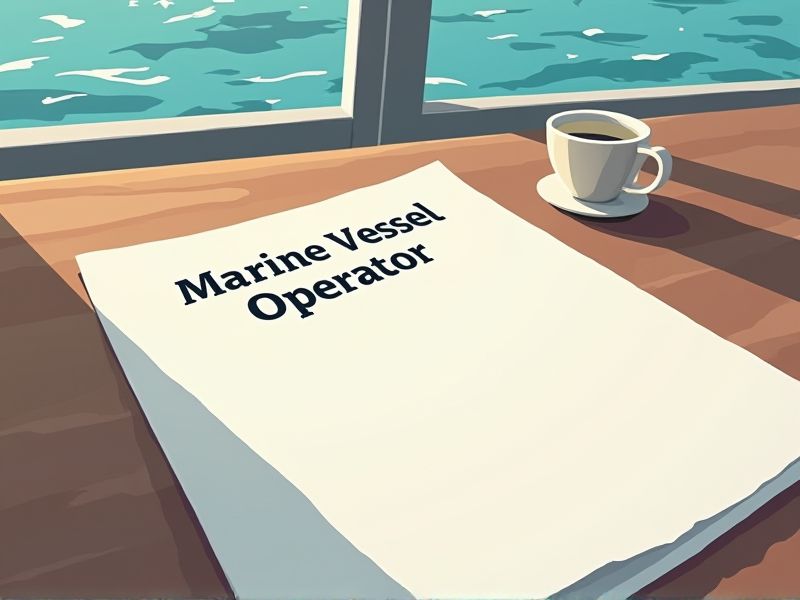
Marine vessel operators must navigate complex maritime regulations and ensure passenger safety, necessitating specific certifications. These certifications validate an operator's knowledge of maritime safety, vessel operation, and environmental regulations. The rigorous training associated with these certifications aims to minimize accidents and ensure efficient vessel management. Some important certifications you may need for a marine vessel operator include the following.
STCW Basic Safety Training
Marine vessel operators need STCW Basic Safety Training because it ensures competency in responding to onboard emergencies, reducing the risk of accidents. Lack of such training often results in inadequate emergency preparedness, leading to higher chances of casualties. The safety training also standardizes safety protocols, facilitating better teamwork among international crews. Industries operating under STCW regulations experience fewer operational disruptions, contributing to more efficient and safer maritime operations.
STCW Advanced Fire Fighting
The STCW Advanced Fire Fighting course equips marine vessel operators with skills to effectively combat shipboard fires, which can protect lives and assets. Fire incidents at sea pose a significant risk, and training enhances response efficiency and safety management. Compliance with international standards like the STCW convention ensures operational safety and industry credibility. Enhanced ability to coordinate firefighting operations enables operators to reduce potential downtime and repair costs, promoting vessel efficiency and reliability.
STCW Proficiency in Survival Craft and Rescue Boats
The STCW Proficiency in Survival Craft and Rescue Boats certification ensures that marine vessel operators are trained to effectively handle life-threatening situations at sea. This training provides essential skills for launching and operating survival craft and rescue boats, directly impacting the safety of passengers and crew. By completing this certification, operators enhance their ability to manage emergency evacuations, reducing potential risks and fatalities. International maritime regulations require this proficiency to maintain high safety standards on commercial vessels, ensuring compliance across the industry.
STCW Medical First Aid
The STCW Medical First Aid certification is vital for marine vessel operators because it equips them with essential skills to manage medical emergencies at sea, where professional medical assistance may not be immediately available. In maritime environments, where isolation from healthcare facilities is common, having trained personnel on board reduces the risk of minor injuries escalating into severe health issues. This certification ensures compliance with international maritime safety regulations, enhancing the overall safety protocols on vessels. Trained personnel can effectively handle medical situations, improving the health outcomes for crew members and passengers.
GMDSS Certification
GMDSS certification ensures that marine vessel operators possess the necessary knowledge for effective communication during emergencies at sea. It mandates understanding of global maritime distress and safety systems, which aids in maintaining safety and compliance with international maritime regulations. This certification also enables operators to utilize advanced navigation and communication equipment accurately. Having certified operators reduces the risk of communication errors and enhances response in distress situations, directly affecting the safety and security of vessel operations.
Bridge Resource Management Certification
Bridge Resource Management Certification is crucial because it enhances communication and teamwork among crew members, which significantly reduces the risk of human error. Effective resource management aids in optimizing the decision-making process during critical situations, thereby increasing the safety of marine operations. Certification ensures operators are equipped with the skills to efficiently utilize available information and technology on the bridge, improving navigational accuracy. The comprehensive training involved fosters a culture of situational awareness and proactive problem-solving, crucial for handling the complexities of maritime navigation.
Maritime Security Awareness (ISPS Code) Certification
Maritime Security Awareness (ISPS Code) Certification is essential for marine vessel operators to comply with international regulations aimed at enhancing ship and port facilities' security. The certification provides operators with the knowledge to identify and mitigate potential security threats, reducing the risk of terrorist incidents and theft. Vessel operators with ISPS Code Certification contribute to safer maritime environments, leading to increased trust and operational efficiency. Compliance with such standards can also prevent costly fines and disruptions, ensuring smooth and secure shipping operations.
Navigation and Ship Handling Certification
Certification in navigation and ship handling provides marine vessel operators with the necessary skills for safely maneuvering vessels, reducing accident risks. Proper certification ensures adherence to maritime regulations, which is critical for maintaining operational compliance and avoiding legal penalties. Trained operators can efficiently manage challenging sea conditions, enhancing the safety and security of both cargo and crew. Certified individuals often possess a deeper understanding of advanced navigation technology, improving the overall operational efficiency of maritime activities.
Maritime Law and Regulations Certification
Maritime Law and Regulations Certification ensures a marine vessel operator understands international standards and legal obligations, which reduces the risk of legal penalties and accidents. It provides essential knowledge on safety regulations, promoting safer navigation and protection of marine environments. Vessel operators with such certification tend to have improved compliance with environmental laws, which helps in reducing pollution and preserving marine biodiversity. Certification enhances professional credibility, often leading to better job prospects and career advancement opportunities in the maritime industry.
Cargo Operations and Stowage Certification
Cargo operations and stowage certification is necessary for marine vessel operators to ensure safe loading and unloading, preventing accidents and loss of cargo. Proper certification aids in optimizing space utilization, which directly impacts the vessel's economic efficiency. Regulatory compliance demands certified personnel to adhere to international maritime standards, reducing liability and penalties. Enhanced knowledge through certification equips operators to make informed decisions during unexpected challenges, facilitating smoother operations.
Summary
When you, as a Marine Vessel Operator, obtain certifications, credibility and trustworthiness in the industry increase. This often leads to more professional opportunities as companies prefer certified operators. Certification can also enhance safety onboard, reducing accident risks and improving compliance with maritime regulations. This, in turn, often results in better operational efficiency and cost savings.
